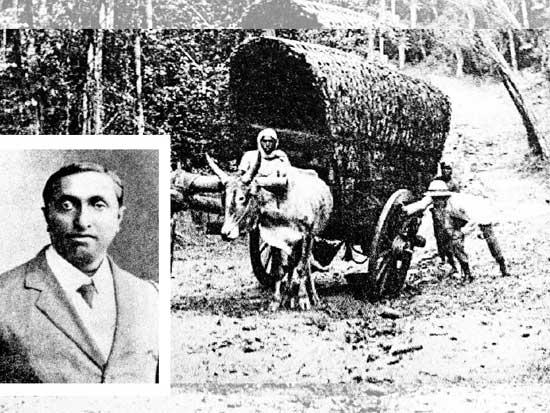Reply To:
Name - Reply Comment
‘Once Inspector John Kotalawala detected Sergeant W. Kelaart taking a bribe of Rs 5/-. The accused Sgt  was kept out of the station and there was displeasure between Kotalawala and Inspector Ohlums over it. When the case came up at Magistrates courts, the Magistrate asked ASP de Saram, to drop the case as it disclosed internal trouble between police officers!’
was kept out of the station and there was displeasure between Kotalawala and Inspector Ohlums over it. When the case came up at Magistrates courts, the Magistrate asked ASP de Saram, to drop the case as it disclosed internal trouble between police officers!’
—History of Ceylon Police - Dep: pp370/371- [A. Kekille verdict?]
Carters’ Strike –August 1906
The carters were a powerful community throughout the 19th century. They possessed the ability to cripple 60 to 70% of the entire goods transport in the island. They dictated terms to all industrialist and plantations and bought over police officers below the rank of ASPs.
“No person driving a single or double bullock cart used for carrying goods shall sit in or upon any part of the cart, pole, shaft, or yoke while so driving”—
The Municipal bye-law was introduced pending approval by Supreme Court. However, the IGP wanted it published in all three languages and it appeared in newspapers. The intention of the police hierarchy was to create dissension among the membership and weaken the organisation as John Kotalawala, retired Police Inspector was involved in the ‘union’.
 Kotalawala who expanded into the transportation industry which depended on bullock carts, decided to give leadership to the carters struggle, when over 5000 carters planned to launch an island wide agitation campaign through a strike. On August 11, 1906 the strike began. Business was crippled; all work in the city came to a standstill. Astute former policeman Kotalawala got a carter to drive his cart standing on the Shaft through a prominent junction in the city in the presence of a senior officer who stopped the cart. The carter challenged the cop, “Your law says, Sir,” the carter protested, “The carter shall not sit on…, but I am standing”
Kotalawala who expanded into the transportation industry which depended on bullock carts, decided to give leadership to the carters struggle, when over 5000 carters planned to launch an island wide agitation campaign through a strike. On August 11, 1906 the strike began. Business was crippled; all work in the city came to a standstill. Astute former policeman Kotalawala got a carter to drive his cart standing on the Shaft through a prominent junction in the city in the presence of a senior officer who stopped the cart. The carter challenged the cop, “Your law says, Sir,” the carter protested, “The carter shall not sit on…, but I am standing”
This humiliating move by their former colleague which was highlighted by the newspaper editors the next morning put the imposers to shame; John antogonised the Police higher ups. ‘Kotalawala deserves to be taught a lesson’, perhaps, they allegedly perceived. The carters were rejuvenated when the mercantile sector carters decided to join the city’s struggle. They left the cattle sheds on 13th morning, realising that they would not be able to balance the carts well, unless they were allowed to sit on the shaft or pole as the situation demanded.
Besides, they knew well, as victims of police harassment that the police lower ranks will misuse the law to make further extortions from them, and were determined to resist the bye law. The shipping of cargo, both crops and Plumbago was badly handicapped, creating mayhem in the plantations and mining industry altogether.
When the government decided that private company carts and gharries should be employed to transport urgent goods under police escort to the wharf, the carters willfully flouted the law by defiantly sitting or occupying the shafts and poles in the presence of policemen. The following day the situation worsened with more carters from other towns joining their Colombo colleagues. Copra and vegetable carts were not operating either. A few carts operating under personal supervision of Europeans moved towards Fort, though the carters of such fleets deliberately loaded the carts in such a manner that the carter being seated on the poles becomes essential to balance the two wheeled machine as instructed by our Ex-Policemen turned businessman who led the carters during the resist.
"Over 5000 carters launched an island wide agitation campaign through a strike on August 11, 1906"
Opposite the Slave Island Police Station, the cops patrolling the street stopped the carts and ordered the carters to obey the rule. They promptly obliged the law enforcement officers without an argument, for some of the carts to go up almost suspending the bulls and others to topple in the middle of the road. The carters were from then onwards allowed to use the poles and shafts. The strike spread to the other areas in the island causing great excitement and anxiety. The prices of provisions and rice in the market rose.
A meeting of Municipal authorities and cart contractors was held in addition to a meeting with Trade Chamber and contractors, with no immediate settlement in sight. Carters gathered in thousands in the city prompting the IG to summon additional men from outstations to meet an emergent situation. Carters and crowds swelled up Pettah, near Kayman’s Gate, in view of another meeting IG had with Chamber heads and contractors, while Kotalawala played a back stage role.
He wrote a letter, or rather a memorandum address directly to the Colonial Secretary pointing out the absurdity of the whole exercise and calling it an iniquitous and uncalled for. He commanded much influence with the carters and contractors. As talks failed, [they were only willing to grant an extension while the carters insist on total repeal of the bye law].
Crowds from Pettah moved towards the Fort and gathered between GPO and the Queen’s House. The IG being informed of the risks involved in allowing a congregation of carters at this high security zone, he immediately rushed from Pettah and sent a message for Superintendent Dowbiggin asking him to rush there. There were several cases of disorderly behavior and violent acts by some drunken strikers, including instances of assault and threats. IG had a word with the Governor and left for Pettah, while Dowbiggin addressed the crowds and convinced them to move out to which they responded.
ASP Daniel was put in charge of the place and Dowbiggin left for Pettah to have further discussions. In Pettah the situation became tense; the shop keepers started putting up shutters. Dowbiggin left ASP Ludovici in Pettah with a battalion of around 200 Policemen and rode towards Fort again.
Negotiations succeeded following a meeting of the Legislative Council and the three day strike was called off. Kotalawala’s memorandum to CS was received with respect and a reply stating Colonial Secretary’s views was received by him. Making things worse, the Colonial Secretary copied his reply to IG not only deteriorating the already strained relations John Kotalawala, the maverick ex policeman had with his old Police colleagues, but leaving a bitter flavor in their minds especially due to the memorandum, and the prompt response he received from Colonial secretary.
Kotalawala, was later elected the President of Ceylon Carters’ Association and earned popularity among ordinary folk. He was the Father of Sir John Kotalawala, the Prime Minister 1953-1956.